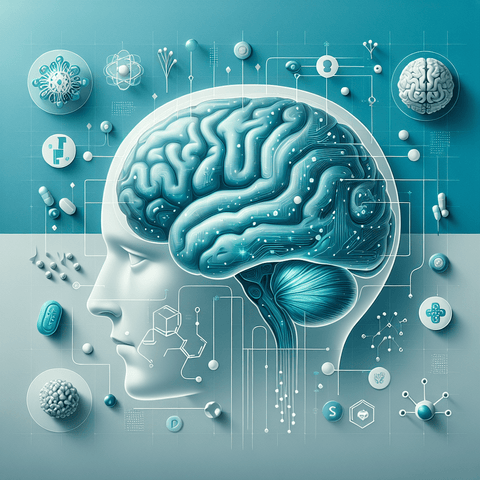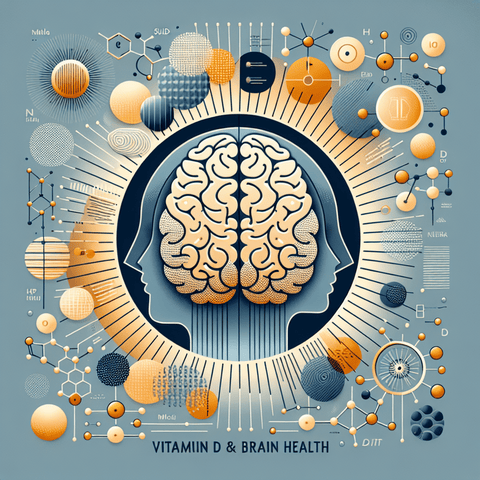Introduction
Maintaining optimal mental clarity and robust cognitive health is a cornerstone of overall well-being. As modern lifestyles become increasingly demanding, college students juggling coursework, professionals managing heavy workloads, and aging populations striving to preserve mental acuity, the importance of supporting brain function through nutrition has gained prominence. Nutritional supplements have emerged as accessible tools to bridge nutritional gaps and bolster brain health. Among these, Vitamin B12 stands out as a vital nutrient, often overlooked yet essential for maintaining mental clarity and cognitive vitality. This comprehensive guide explores how Vitamin B12 supports your brain, the mechanisms behind its benefits, and practical ways to optimize your B12 levels for mental wellness.
Vitamin B12 and Its Essential Role in Nutritional Supplements
Vitamin B12, scientifically known as cobalamin, is a water-soluble vitamin critical for many biochemical processes within the human body. It is naturally present in animal products such as meat, eggs, dairy, and shellfish, making it an essential nutrient for individuals consuming a typical omnivorous diet. However, in certain populations, such as vegans, the elderly, or individuals with gastrointestinal conditions, B12 deficiency can be prevalent, leading to a spectrum of health issues. That is why supplementation, whether through oral tablets, sublingual sprays, or injections, plays a pivotal role in preventing or correcting B12 deficiencies.
The significance of maintaining adequate B12 levels is underscored by its involvement in DNA synthesis, red blood cell formation, and neurological function. Deficiency in B12 is often linked to macrocytic anemia, neurological symptoms, and cognitive decline. As dietary sources may not be sufficient or bioavailability may be compromised due to absorption issues, supplementation becomes an effective strategy. Today, B12 supplements come in various forms, each with unique benefits:
- Methylcobalamin: The biologically active form of B12, directly usable by the body with superior bioavailability and stability.
- Cyanocobalamin: A common synthetic form, widely used in supplements due to cost-effectiveness and stability, which the body converts into active forms.
- Other forms: Hydroxocobalamin and adenosylcobalamin, used less frequently but also beneficial for targeted needs.
How Vitamin B12 Supports Brain Function
The relationship between Vitamin B12 and brain health is deeply rooted in neurobiological processes. B12 is essential for neuroplasticity—the brain's ability to reorganize itself by forming new neural connections. This plasticity underpins learning, memory, and recovery from brain injury. Adequate levels of B12 facilitate this adaptive capacity by supporting the synthesis of methyl groups necessary for the methylation of DNA, proteins, and lipids involved in neural function.
Empirical evidence demonstrates that populations with sufficient B12 levels tend to perform better on cognitive assessments, including memory, attention, and problem-solving tasks. Conversely, low B12 often correlates with cognitive decline, particularly in older adults, highlighting its importance in preserving mental sharpness. More specifically:
- Memory retention and learning efficiency are improved when B12 levels are adequate, partly because B12 influences the production of neurotransmitters like serotonin and dopamine.
- Research indicates that individuals with B12 deficiency may experience impairments in executive functioning, information processing speed, and verbal fluency.
- Supplementing with B12, especially in deficient individuals, has shown potential in reversing certain cognitive deficits and improving mood and mental clarity.
When selecting a B12 supplement for cognitive health, it is critical to choose an effective form such as methylcobalamin or cyanocobalamin to optimize absorption and utilization. For more options, explore the [Vitamin B12 supplements collection](https://www.topvitamine.com/collections/vitamin-c-benefits-immunity-antioxidant-energy).
Enhancing Neurological Support with Vitamin B12
The neurological benefits of Vitamin B12 are profound. At the cellular level, B12 plays a crucial role in maintaining the integrity of the myelin sheath—a protective fatty layer encasing nerve fibers. This sheath facilitates rapid and efficient nerve impulse transmission. When B12 levels are insufficient, demyelination can occur, leading to neurological symptoms such as tingling, numbness, and in severe cases, neurological deterioration.
By supporting myelin synthesis and maintenance, B12 contributes to nervous system resilience, reducing the risk of neuropathies and promoting effective nerve signaling. Several mechanisms underpin this support:
- Facilitation of methylation processes essential for myelin sheath integrity.
- Protection against oxidative stress, which damages nerve cells.
- Promotion of nerve regeneration and repair after injury.
Furthermore, B12 works synergistically with other nutrients like folate and vitamin B6 to further enhance nerve health. Ensuring adequate intake through supplements or diet can significantly bolster neurological functions and safeguard against age-related decline. For targeted support, consider combining B12 with other nerve-supportive nutrients available at [Magnesium benefits](https://www.topvitamine.com/collections/magnesium-benefits-energy-muscle-bone-support).
Energy Metabolism: How Vitamin B12 Fuels Your Day
Beyond its neural roles, Vitamin B12 is integral to energy metabolism—the process of converting food into usable energy. B12 functions as a cofactor in the mitochondrial enzymes that facilitate the breakdown of fats and proteins, ultimately generating ATP, the primary energy currency of cells. Adequate B12 levels prevent fatigue and promote sustained alertness, which is vital for mental performance and daily productivity.
Symptoms of B12 deficiency include persistent tiredness, mental fog, and difficulty concentrating. These symptoms underscore B12's importance in maintaining mental stamina. When B12 is deficient, the body's capacity to produce energy diminishes, leading to feelings of exhaustion and decreased mental acuity. Incorporating B12 supplements can help restore energy levels, especially in populations with increased needs or absorption challenges.
For individuals seeking an energy boost, consider integrating B12 into your daily routine. To explore high-quality options, check out the [Vitamin B12 supplements](https://www.topvitamine.com/collections/vitamin-c-benefits-immunity-antioxidant-energy), designed to support daytime alertness and overall vitality.
Nerve Health: Maintaining a Strong and Resilient Nervous System
Nerve health is foundational to cognitive function and emotional stability. A healthy nervous system relies on a well-maintained network of nerves that communicate seamlessly to coordinate bodily functions and responses. Vitamin B12 is essential for nerve cell regeneration, synaptic transmission, and overall nerve resilience.
Deficiencies in B12 can lead to nerve damage, presenting as tingling sensations, burning, or numbness—symptoms often associated with peripheral neuropathy. Prolonged deficiency might exacerbate neurodegeneration, impacting mobility and cognition. Ensuring sufficient B12 intake through supplements tailored for nerve health, possibly combined with other nutrients like B6 and folate, can build nerve resilience and prevent deterioration.
Supporting nerve health is especially vital for aging populations, as natural metabolic decline can compromise nerve function. To enhance your nerve support regimen, explore combinations with [Vitamin K benefits](https://www.topvitamine.com/collections/vitamin-k-benefits-bone-blood-health), which support vascular and nervous health.
Cognitive Boost: Unlocking Greater Mental Clarity and Focus with Vitamin B12
Ultimately, the goal for many seeking cognitive enhancement is improved mental clarity, sharper focus, and reduced mental fatigue. Vitamin B12 plays a pivotal role in achieving these objectives. Its impact on methylation and neurotransmitter synthesis supports better mood regulation, stress management, and cognitive performance.
Older adults often experience declines in B12 levels, which can accelerate cognitive deterioration. Supplementing with B12 has been linked to improvements in memory, processing speed, and overall cognitive function. Practical strategies include regular supplementation with methylcobalamin or cyanocobalamin, combined with healthy lifestyle habits such as regular physical activity, mental exercises, and balanced nutrition.
For those interested in a comprehensive cognitive support plan, blending B12 with nootropics and lifestyle adjustments can significantly amplify benefits. Explore options at [DHA, EPA, Omega-3](https://www.topvitamine.com/collections/dha-epa-omega-3-supplements), known for their neuroprotective properties.
Conclusion
Vitamin B12 is undeniably a cornerstone of mental and cognitive health, affecting everything from neurotransmission and nerve integrity to energy production and neuroplasticity. Ensuring optimal B12 levels through diet and supplementation can support cognitive function, mental clarity, and neurological resilience across all age groups. Given the prevalence of B12 insufficiency, especially among vulnerable populations, proactive management is crucial for maintaining mental vitality and overall well-being.
As ongoing research continues to uncover the multifaceted roles of B12, it remains a promising area for enhancing cognitive health. For personalized recommendations, consider consulting healthcare providers and exploring high-quality B12 supplements on TopVitaminE.com. Staying vigilant about your B12 intake can unlock the secret to sharper minds and more vibrant mental health.
Q&A Section
Q1: How does Vitamin B12 influence mental clarity and cognitive performance?
Vitamin B12 supports methylation processes crucial for neurotransmitter synthesis and neural plasticity. Adequate B12 levels improve communication between nerve cells, enhance memory retention, and reduce mental fog, thereby boosting mental clarity and cognitive performance.
Q2: What are the signs of Vitamin B12 deficiency related to brain health?
Signs can include forgetfulness, difficulty concentrating, mental fatigue, mood changes, and in severe cases, cognitive decline. Physical symptoms such as tingling sensations and numbness may also indicate nerve-related B12 deficiency.
Q3: What forms of B12 are best for supporting brain health?
Methylcobalamin is often preferred due to its superior bioavailability and direct activity in the body. Cyanocobalamin is widely used and effective, especially when converted into active forms. Consulting with a healthcare professional can help determine the most suitable form for individual needs.
Q4: Can B12 supplements improve memory and learning in older adults?
Yes, research indicates that B12 supplementation can improve memory, processing speed, and overall cognitive function in B12-deficient older adults, helping to slow or reverse cognitive decline.
Q5: How can I optimize my B12 intake for cognitive health?
Consume B12-rich foods or opt for high-quality supplements in active forms like methylcobalamin. Regular monitoring of B12 levels, especially if you are at risk of deficiency, is recommended. Combining B12 with other nutrients such as folate and omega-3 fatty acids may provide synergistic benefits for brain health.
Important Keywords
- Vitamin B12
- Cognitive health
- Mental clarity
- Neuroplasticity
- Neurological support
- Nerve health
- Energy metabolism
- Brain function
- B12 deficiency
- B12 supplements
- Methylcobalamin
- Cyanocobalamin
- Neuroprotection
- Memory retention
- Age-related cognitive decline



